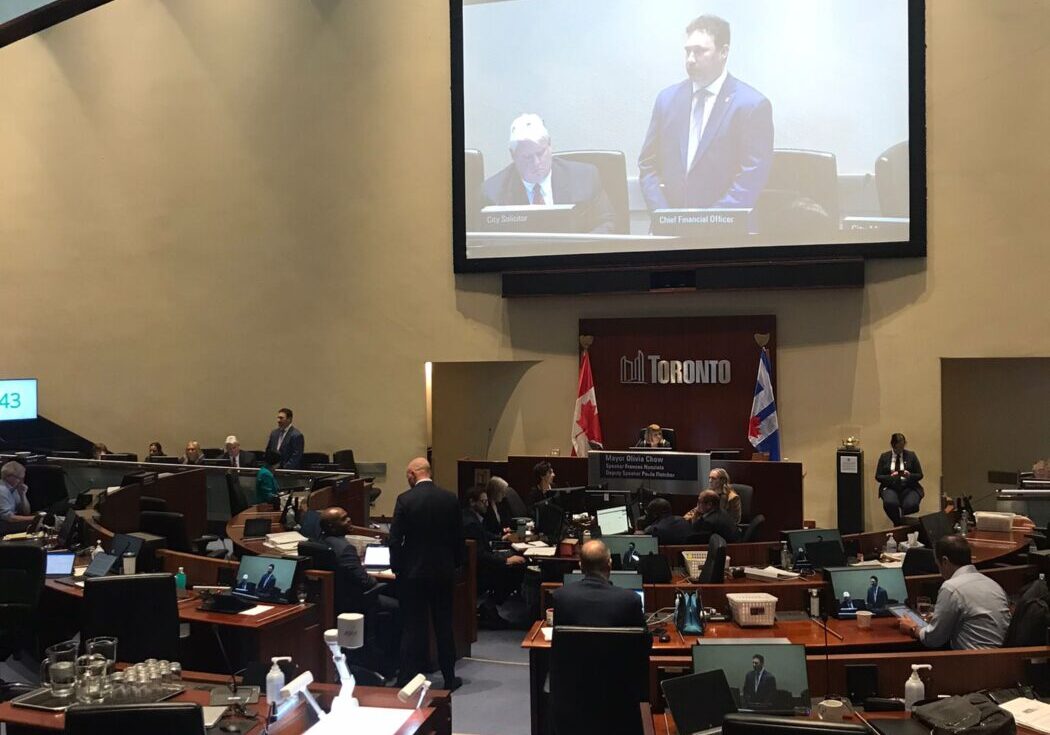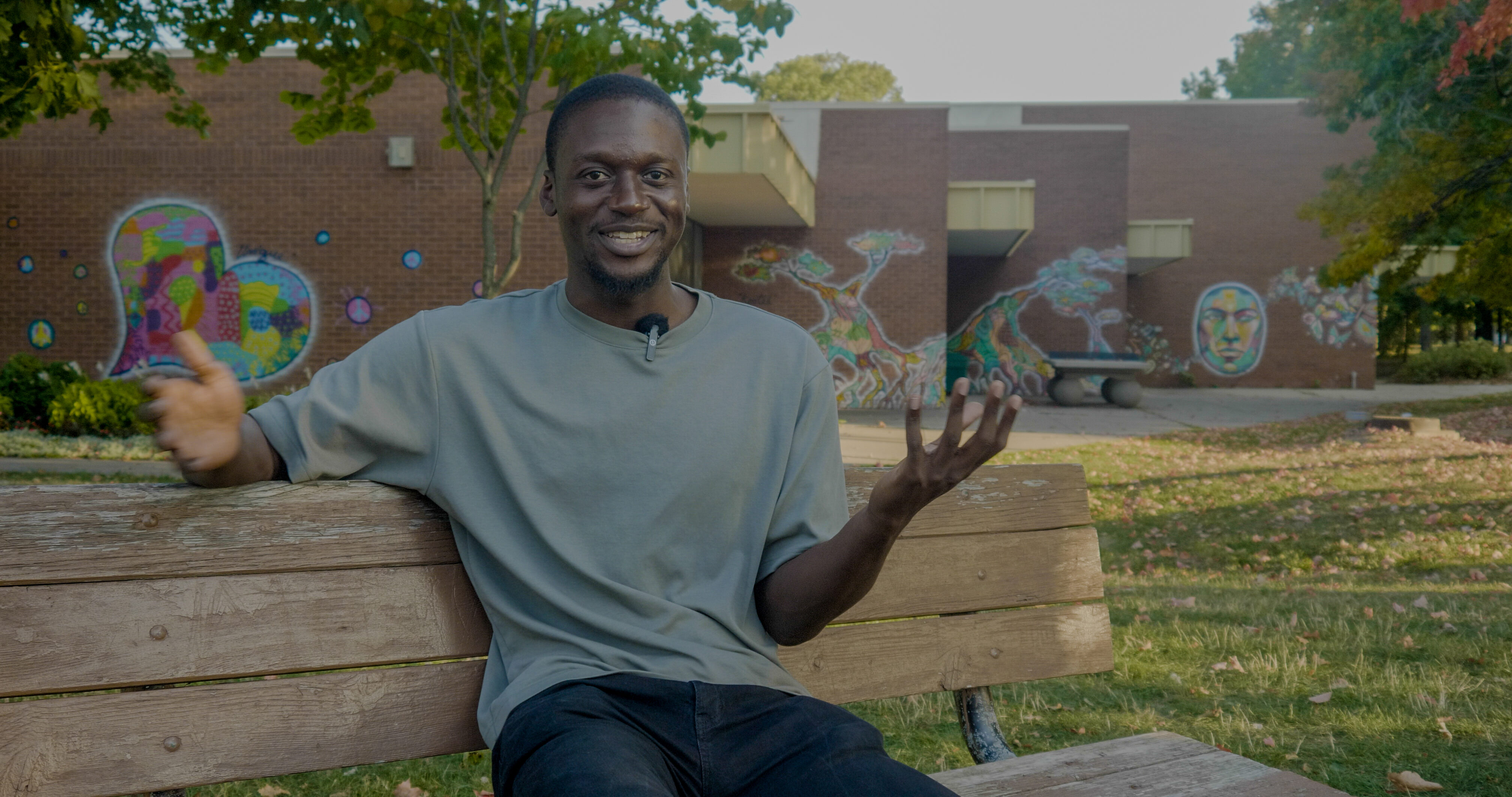THE GREEN LINE
DOCUMENTERS NOTES
Can the Vacant Home Tax solve Toronto’s housing woes? Alexandra Park offers a glimpse.
A tense council meeting saw motions to cancel or pause the Vacant Home Tax fail, with Mayor Olivia Chow defending the program as crucial to addressing Toronto’s housing crisis.

TORONTO CITY COUNCIL DEBATES THE REDESIGN OF THE VACANT HOME TAX ON Oct. 10, 2024.


Eugene Slonimerov
Belarusian-Canadian who specializes in urban and conflict studies and the arts. Cares about abandoned public spaces, community-building, mapping memories and solving the housing crisis. Kensington Market is home.
October 11, 2024
These city meeting notes are part of Documenters Canada. Learn more about our program here.
While some councillors pushed to pause or cancel the Vacant Home Tax program, Mayor Olivia Chow defended its role in addressing the housing crisis, highlighting the Alexandra Park-Tridel model as a success in building mixed-income neighbourhoods and using tax revenue to support affordable housing projects.
Just after 2:30 p.m in Toronto City Hall’s main auditorium, around 50 people were in the audience alongside some major news outlets. The room was tense with a lot of bantering between the councillors and people talking over the speaker.
The following officials were in attendance:
- Frances Nunziata, Councillor, York South-Weston – Speaker
- Paula Fletcher, Councillor, Toronto-Danforth – Deputy Speaker
- Mayor Olivia Chow
- Paul Ainslie, Councillor, Scarborough-Guildwood
- Brad Bradford, Councillor, Beaches-East York
- Alejandra Bravo, Councillor, Davenport
- Jon Burnside, Councillor, Don Valley East
- Shelley Carroll, Councillor, Don Valley North
- Lily Cheng, Councillor, Willowdale
- Mike Colle, Councillor, Eglinton-Lawrence
- Vincent Crisanti, Councillor, Etobicoke North
- Stephen Holyday, Councillor, Etobicoke Centre
- Parthi Kandavel, Councillor, Scarborough Southwest
- Ausma Malik, Councillor, Spadina-Fort York
- Nick Mantas, Councillor, Scarborough-Agincourt
- Josh Matlow, Councillor, Toronto-St. Paul’s
- Jennifer McKelvie, Councillor, Scarborough-Rouge Park
- Chris Moise, Councillor, Toronto Centre
- Amber Morley, Councillor, Etobicoke-Lakeshore
- Jamaal Myers, Councillor, Scarborough North
- James Pasternak, Councillor, York Centre
- Gord Perks, Councillor, Parkdale-High Park
- Anthony Perruzza, Councillor, Humber River-Black Creek
- Dianne Saxe, Councillor, University-Rosedale
- Stephen Conforti, CFO and Treasurer of the City of Toronto
- Abigail Bond, Executive Director - Housing Secretariat at City of Toronto
- Beth Waldman, Chief Communications Officer
- John Longarini, Interim Director Revenue Service, City of Toronto
- Wendy Walberg, City Solicitor
REDESIGNING THE VACANT HOME TAX
What did members of the community have to say?
Coun. Bradford, Coun. Holyday and Coun. Crisanti all voiced similar issues on how the Vacant Home Tax (VHT) program was rolled out. The letters property owners received for the first time to ask them to confirm if their property is vacant or not “scared” them and “induced anxiety,” according to the councillors, who said the owners interpreted it as their taxes going up. Mayor Chow used the “heart attack” analogy to describe the feelings communicated by some homeowners, conceding the roll out was not a smooth one, though they are fixing it now.
Most questions were directed to Stephen Conforti, CFO and city treasurer, as well as his staff.
Bradford asked Conforti about how the consultations and outreach for the 2024 VHT rollout were going. Conforti said the challenges were mainly technical: navigating the portal, as some have barriers to technology or English is not their first language. His staff also engaged with councillors and councillors’ offices to hear feedback.
About 8,700 homes were vacant in the 2023 tax year, which is down from about 10,200 in 2022. Among the 8,700, there were under 1,500 self-declared as vacant (17.5 per cent) while the rest were deemed vacant by the city (82.5 per cent).
- Bradford wanted to know what the process is to deem a home as vacant. Conforti said if the owners don’t declare, then the property is deemed vacant, which they can then appeal.
- Bradford asked if they asked the owners why the property is vacant. Conforti said they haven’t yet, but the new year’s survey will do that.
Coun. Perks asked whether or not these 10,200 vacant homes are predominantly condos. Conforti said a majority are, but that he does not have “an absolute number.” Perks followed up with Abigail Bond, city housing secretariat, by asking how many people don’t have homes in Toronto. The answer was around 10,500 using the shelters and several hundred to a thousand living outside.
Conforti said the VHT is a disincentive to having a vacant home. This year, the VHT is at 1 per cent, but council has given incentive to increase that to three. Coun. Burnside asked if a large number of vacancies are investors who are looking to make money.
Burnside asked the city for evidence that the reason behind the decrease of vacant homes is due to the VHT. Conforti explained that a program like this was rolled out in Vancouver and achieved a 54 per cent reduction in vacant properties within five years.
Holyday asked Conforti whether there is “any way of assuring us that the objective of the vacant homes tax to reduce the number of vacant homes has been successful?" Conforti replied that it’s too early to determine the trend, which is why we look at Vancouver. Conforti added that it’s only a “small sample size” right now, but some stopped keeping their properties vacant while some paid the tax. Conforti pointed out that revenues go to the Multi-Unit Residential Acquisition (MURA) program and other initiatives for increasing housing supply.
Coun. Carroll asked how much was collected in two years from the VHT. Conforti replied $107 million. This is above what it costs to operate the program, according to both Carroll and Conforti. Carroll asked how much it would cost to build 10,000 properties and Conforti said it would be roughly $5.5 billion. Carroll asked if Revenue Services understood how upsetting to homeowners the technical flaws were in the program this year. Conforti said all the teams working on this program did, and have worked to resolve it in the redesign. He added that this year, they have the resources to run the program, and will have real-time data from each ward to ensure that the declaration period goes smoothly.
Coun. Bravo asked how the city’s acquisition function helps solve the housing crisis. Bond, the housing secretariat, replied that since 2022, the city has helped nonprofits acquire 368 homes in 15 buildings; they’ve moved from the private sector to the nonprofit sector. By doing so, they have limited rent increases . Bravo followed up by asking if we can assume that a significant number of vacant rental units are owned by investors who have a speculatory incentive keeping them empty. Conforti replied that while he can’t definitively answer that, you can make that assumption.
Coun. Myers brought up the question of whether or not we will start using utility data to gauge the number of vacant homes. Conforti responded that they are working with legal services and city clerks, and waiting for a privacy commissioner report. As it stands, utility data can only be used to audit homes on a random sampling basis only.
Coun. Matlow asked whether or not a call centre would be set up for people to ask questions about the VHT and how many staff would work there. John Longarini, the city’s interim director of Revenue Services, replied that people can call 311 and Revenue Services. Conforti added that the call centre will be supplemented with 30 staff and 8 surge staff.
Coun. Crisanti asked how much the call centre would cost and its operational hours. Longarini said the budget is $1.1 million, and that it would operate from 8:30 a.m. to 9 p.m., with additional coverage on Saturdays.
Chow replied that the city needs this tax, given that we are in the middle of a housing crisis. Vancouver implemented this tax, and there was no uproar.
Holyday motioned to cancel the VHT immediately.
- He called the program upsetting because people are asking where the money goes, and according to him, they are upset that the revenues go only to government-subsidized affordable housing.
- He asked, “What’s wrong with accumulating wealth and investing in properties?”
- Matlow said in response that a home should not be just an investment since it financializes the housing sector.
Chow rebutted Holyday’s argument by pointing to the experiment with Tridel and Alexandra Park. The mayor explained that the funds from the tax also go to building regular market unit housing within a portfolio that then helps Tridel construct other buildings, which are rent-geared-to-income homes. Chow explained that this helps create healthy mixed income neighbourhoods (not only affordable housing is getting built).
Bradford brought a motion to pause the program and to ask Conforti, the CFO and treasurer, to come back with a program that would place the onus on the city and/or owners of vacant properties to identify vacant homes. He said it was a burden to put the onus on every homeowner in Toronto, adding that a lot of the people paid the fee just because they missed filling the form.
Matlow made a motion to keep negotiating with CUPE 79, which he claimed he just learned was not going well. The motion was to ensure the call centre would be staffed in accordance with the existing collective agreement.
- He acknowledged that the VHT program in its original form was a “hot mess” and felt punitive. He agreed with Bradford’s “onus on the city” vision for the renewed program, but said the city can’t pause the tax right now since it is “in the middle of a housing crisis.”
- He acknowledged that people who supported the VHT are now against it because they “felt some heat” from having the onus placed on homeowners.
- He stressed that we need to offer other tools, such as the return of rent control.
Carroll called Bradford’s and Holyday’s motions foolish, and made a mockery of the efforts staff had already done to set up the program. She urged city councillors to vote no to their motions.
What are the takeaways for Toronto neighbourhoods (especially Alexandra Park, Kensington Market and Chinatown)?
- Carroll made a call to Toronto homeowners, saying, “Help us renew the data” and thereby locate where the vacant homes are. Starting Nov 1, all homeowners will receive notice through mail, which has a letter with a QR code for them to declare the vacancy status of their home. They will also be provided a phone number to call for support and translation if English is their second language.
- Our neighbourhoods of Alexandra Park, Chinatown and Kensington Market would be interested to know that the high-rise Tridel development at Dundas West and Denison is being looked at as a model for future projects, including in Regent Park or Lawrence Heights.
- The revenue from the VHT has been used to fund the acquisition of multi-use buildings for nonprofits like the Kensington Market Community Land Trust. The KMCLT continues advocating to keep the (MURA) program growing.
What were the outcomes of these motions?
Holyday’s motion for council to cancel the VHT program, effective immediately, did not carry.
- Members that voted Yes (4) were: Brad Bradford, Jon Burnside, Vincent Crisanti, Stephen Holyday.
- Members that voted No (19) were: Paul Ainslie, Alejandra Bravo, Shelley Carroll, Olivia Chow, Mike Colle, Paula Fletcher, Parthi Kandavel, Ausma Malik, Nick Mantas, Josh Matlow, Jennifer McKelvie, Chris Moise, Amber Morley, Jamaal Myers, Frances. Nunziata (Chair), James Pasternak, Gord Perks, Anthony Perruzza, Dianne Saxe.
- Members that were absent (2) were: Lily Cheng, Michael Thompson.
Bradford’s motion for council to pause the VHT program for the 2025 taxation year and to direct Conforti, the CFO and treasurer, to report back with recommendations on options for an alternative program that places the onus on the city and/or owners of vacant properties to identify vacant homes, did not carry.
- Members that voted Yes (5) are: Brad Bradford, Jon Burnside, Vincent Crisanti, Stephen Holyday, Nick Mantas.
- Members that voted No (18) are: Paul Ainslie, Alejandra Bravo, Shelley Carroll, Olivia Chow, Mike Colle, Paula Fletcher, Parthi Kandavel, Ausma Malik, Josh Matlow, Jennifer McKelvie, Chris Moise, Amber Morley, Jamaal Myers, Frances. Nunziata (Chair), James Pasternak, Gord Perks, Anthony Perruzza, Dianne Saxe.
- Members that were absent (2) are: Lily Cheng, Michael Thompson.
Matlow’s motion for council to direct city manager Paul Johnson, in consultation with all relevant divisions, to ensure that the new VHT call centre is staffed in accordance with the existing collective agreements, was carried.
Fact-Check Yourself
Sources and
further reading
Don't take our word for it —
check our sources for yourself.
Care about our city, but don't know how to make it better? Sign up for simple, step-by-step guides to solving problems in your neighbourhood — one small action at a time.
